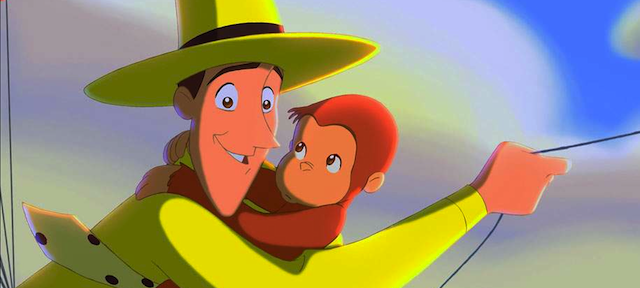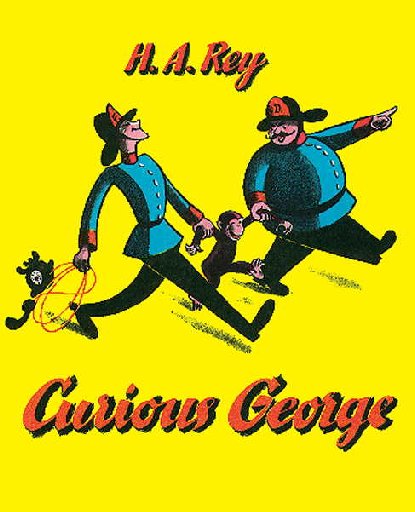
A few particularly brilliant passages from the final chapter of Dr. Dorothy Martyn’s expert work on child psychology, “The Man in the Yellow Hat: Theology and Psychoanalysis in Child Therapy”. As always, to fully grasp what she’s getting at we must put ourselves in the position of child, lest we turn what is a descriptive project into a prescriptive one:
 “Human growth is generally understood to proceed in a line of movement originating in the human subject. In looking back to the children’s journeys [described earlier in the book], I would certainly affirm that forces of growth and maturation are very much in evidence. I believe, however, that the activating of these forces is dependent on a prior line of movement, that is, God’s own action in moving toward us.” (pg. 167)
“Human growth is generally understood to proceed in a line of movement originating in the human subject. In looking back to the children’s journeys [described earlier in the book], I would certainly affirm that forces of growth and maturation are very much in evidence. I believe, however, that the activating of these forces is dependent on a prior line of movement, that is, God’s own action in moving toward us.” (pg. 167)
—————
“At this point, it is enough to mention that manipulation is powerless to evoke any deep motivational change [in an ill-behaved child].
What does evoke genuine change of motivation and behavior in these impulse-ridden children is a mode of relating to them that has this ‘can’t-earn’ quality. It is an attitude of a prevenient, uncontingent offering of the ego of the caring adult in a freely given alliance with the ego of the child against the destructive impulse, which is then revealed to the child also as alien and undesirable.
This stance of offering to lend aid to the child’s person against a common enemy can be expressed quite simply to a child trapped in his own aggression: ‘You seem to be having trouble with your hands this morning – try holding on to me.’ ‘If your feet are giving you trouble, sit on them’… ‘That stick is no help to you – give it to me’…
 While such phrases as these are not magical in themselves, they derive from an attitude of being with, not against, the child, and this attitude has an effect not unlike what Barth refers to as the difference in a response of gratitude as opposed to ‘a tribute to tyranny’. Obedience obtained from a child as a tribute to the tyranny of an adult, however disguised as reward for good behavior, is quite different from the obedience that is the spontaneous offering of gratitude for the free, uncontingent gift of the person of the adult in alliance against the alien force.
While such phrases as these are not magical in themselves, they derive from an attitude of being with, not against, the child, and this attitude has an effect not unlike what Barth refers to as the difference in a response of gratitude as opposed to ‘a tribute to tyranny’. Obedience obtained from a child as a tribute to the tyranny of an adult, however disguised as reward for good behavior, is quite different from the obedience that is the spontaneous offering of gratitude for the free, uncontingent gift of the person of the adult in alliance against the alien force.
It is also striking that a child recognizes the destructive force as alien to himself only in the light of such a relationship, a fact that brings us back to [Karl] Barth’s point that the true situation of human beings and their idols is revealed only in God’s grace happening to them.” (153-54)
—————
 “Grace is unhindered by unworthiness or opposition. Again, it is these children who are hospitalized because they are overrun with destructive urges who illustrate… this characteristic of grace. I have observed that a mode of relating to the children that is informed by the nature of grace is distinguishable by a greater invulnerability to the rage and aggression of the child.
“Grace is unhindered by unworthiness or opposition. Again, it is these children who are hospitalized because they are overrun with destructive urges who illustrate… this characteristic of grace. I have observed that a mode of relating to the children that is informed by the nature of grace is distinguishable by a greater invulnerability to the rage and aggression of the child.
The adult, without doubt, can be vulnerable and provoked into aggression also. But when given an attitude of grace, the attitude itself is not affected by unworthiness or opposition. When grace is present, its power over enmity against it reveals itself. The level of aggression has no effect on it, while the grace distinctly has an effect on the level of aggression. This fact reveals where the real power lies.” (pg. 154)
—————
“William, who had such trouble with ‘hitting people in the face,’ manifests the relative power of an attitude informed by grace and one of forced compliance. For most of his few years, William had been subjected to attempts to control him by various methods, generally based on ‘what he deserved’. What he deserved was mostly punishment, which led to more anger, which led to more punishment. The impotence of that line of power is thus revealed.
The power that reached him, that enabled him to subdue the wild animals, was the power of a relationship in which uncontingent, prevenient acceptance came first, allying itself with him and not against him… Something called forth life in him, and that something was grace.” (pg. 156-57).

COMMENTS
One response to “The Man In The Yellow Hat, or Grace With Difficult Children”
Leave a Reply













DZ,
Thank you SO MUCH for posting this. A lingering concern of mine since learning the Gospel has been, “How do I apply this with children?”
What an important dissertation!!